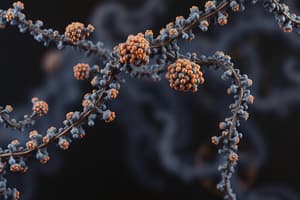Podcast
Questions and Answers
What percentage of "solved" cases in a cohort of 5647 families were accounted for by transcript-deleterious variants (TDVs)?
What percentage of "solved" cases in a cohort of 5647 families were accounted for by transcript-deleterious variants (TDVs)?
- 5%
- 10%
- 15% (correct)
- 20%
What is the diagnostic rate of whole-exome sequencing (WES) for Mendelian disorders?
What is the diagnostic rate of whole-exome sequencing (WES) for Mendelian disorders?
- 10-25%
- 25-52% (correct)
- 52-75%
- 75-90%
What percentage of disease-causing mutations are contributed by splice-altering variants?
What percentage of disease-causing mutations are contributed by splice-altering variants?
- 5-15%
- 15-30%
- 30-45%
- 45-60% (correct)
Flashcards are hidden until you start studying
Study Notes
- Whole-exome sequencing (WES) has a diagnostic rate of 25-52% for Mendelian disorders.
- Non-coding variants (NCV) may contribute to the remaining undiagnosed cases.
- Whole transcriptome sequencing (WTS) is a promising supplement to WES.
- Transcript-deleterious variants (TDVs) account for 15% of all "solved" cases in a cohort of 5647 families.
- RNA analysis can establish a diagnosis in 13.5% of patients with "negative" clinical WES reports.
- RT-PCR is effective in obtaining definitive results for the overwhelming majority of variants.
- TDVs may modulate penetrance even in highly penetrant Mendelian disorders.
- NCVs mediate their effects through RNA either directly or indirectly.
- Splice-altering variants contribute 15-60% of disease-causing mutations.
- Transcriptomics holds a promising role in delineating Mendelian diseases.
Studying That Suits You
Use AI to generate personalized quizzes and flashcards to suit your learning preferences.




